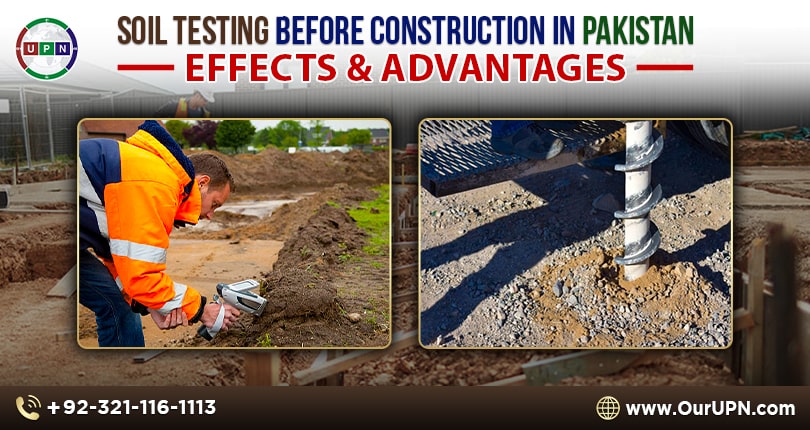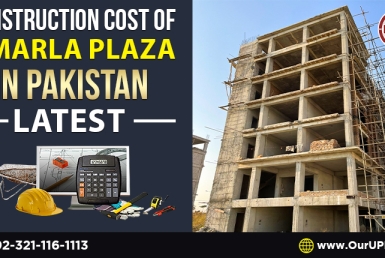Soil Testing Before Construction in Pakistan – Effects and Advantages

Introduction
When building a new structure or undertaking a significant renovation, soil testing is an essential step that should not be overlooked. Soil testing helps identify potential problems with the soil that could impact the stability and safety of the building. In Pakistan, where many areas are prone to earthquakes, soil testing is even more critical. In this article, we will explore the effects and advantages of soil testing before construction in Pakistan.
Effects of Soil Testing Before Construction in Pakistan
Soil testing before construction can have a significant impact on the safety and stability of the structure. By analyzing the soil’s properties, soil testing can help determine the best foundation type and depth to support the structure’s weight. The soil’s stability is also critical in ensuring the building can withstand natural disasters such as earthquakes, floods, and landslides.
Moreover, soil testing can help identify potential problems or hazards that could affect the construction project’s progress. By understanding the soil’s composition, contractors can plan accordingly and make necessary adjustments to ensure a successful construction process. Soil testing can also help determine the appropriate materials and construction techniques to use in the project, saving time and money in the long run.
The Effects of Not Conducting Soil Tests before Construction in Pakistan
Pakistan is located in a seismically active region, and earthquakes have caused significant damage to the country’s infrastructure. When building a new structure or undertaking a significant renovation, it is crucial to ensure that the soil is stable and can support the weight of the building. Failure to conduct soil tests before construction can result in various problems, including:
Structural Damage: If the soil is not stable, it can cause the building to shift or sink, resulting in structural damage.
Higher Costs: Building on unstable soil can increase costs due to the need for additional reinforcement or even a complete rebuilding of the structure.
Safety Hazards: Unstable soil can result in safety hazards, such as sinkholes or landslides that can pose a risk to the occupants of the building.
Legal Issues: In the event of a disaster, if it is found that the building was constructed on unstable soil, legal issues can arise.
The Advantages of Conducting Soil Testing before Construction
Conducting soil tests before construction in Pakistan offers several advantages, including:
Improved Safety: Soil tests help identify potential safety hazards, such as unstable soil, sinkholes, or landslides, which can be addressed before construction begins.
Cost Savings: Soil testing can help identify potential problems with the soil, allowing for more accurate cost estimates and avoiding unexpected expenses during construction.
Better Quality Construction: Soil testing ensures the building’s foundation is constructed on stable ground, resulting in a higher quality and more durable structure.
Compliance with Regulations: Soil testing is required to obtain building permits in many areas, and failure to conduct soil tests can result in legal issues.
The Soil Testing Process
The soil testing process involves taking soil samples and analyzing them in a laboratory. The laboratory analysis determines the soil’s composition, texture, density, and moisture content. The results of the soil test help identify potential problems with the soil and determine the appropriate foundation design for the building.
Final Words
In conclusion, soil testing before construction in Pakistan is essential for ensuring the safety and stability of a building. Failure to conduct soil tests can result in structural damage, higher costs, safety hazards, and legal issues. Conducting soil tests offers several advantages, including improved safety, cost savings, better quality construction, and compliance with regulations. Therefore, conducting soil tests before any construction project in Pakistan is highly recommended.
Frequently Asked Questions
Here are answers to commonly asked questions
What is soil testing?
It is a process used to determine soil’s physical and chemical properties for construction purposes.
What types of soil tests are commonly used in Pakistan?
Common types of soil tests used in Pakistan include Standard Penetration Test (SPT), Cone Penetration Test (CPT), Plate Load Test (PLT), Shear Strength Test, Moisture Content Test, and Atterberg Limits Test.
Why is soil testing important before construction in Pakistan?
Soil testing is essential before construction in Pakistan because it helps prevent structural failure, identify soil problems, and reduce construction costs.
What is the process of soil testing in Pakistan?
The soil testing process in Pakistan involves site visits, soil sampling, laboratory testing, data analysis, and reporting.
What are the advantages of soil testing before construction in Pakistan?
Advantages of soil testing before construction in Pakistan include avoidance of structural failure, cost savings, better planning and designing, and environmental protection.
Please contact Universal Property Network For More Information click here or visit our Youtube channel for further assistance.




